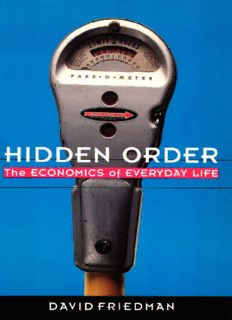
Hidden Order: The Economics of Everyday Life PDF
Preview Hidden Order: The Economics of Everyday Life
HIDDEN ORDER Previous Works by David Friedman Price Theory The Machinery of Freedom The ECONOMICS of EVERYDAY LIFE DAY I D FRIEDMAN - • HarperB usiness A Division of HarperCollinsPublishers A hardcover edition of this book was published in 1996 by HarperBusiness, a division of HarperCollins Publishers. HIDDEN ORDER. Copyright© 1996 by David Friedman. All rights reserved. Printed in the United States of America. No part of this book may be used or reproduced in any manner whatsoever without written permission except in the case of brief quotations embodied in critical articles and reviews. For information address HarperCollins Publishers, Inc., 10 East 53rd Street, New York, NY 10022. HarperCollins books may be purchased for educational, business, or sales pro motional use. For information please write: Special Markets Department, HarperCollins Publishers, Inc., 10 East 53rd Street, New York, NY 10022. First paperback edition published 1997. Designed by Nancy Singer The Library of Congress has catalogued the hardcover edition as follows: Friedman, David. Hidden order: the economics of everyday life I by David Friedman. p. em. Includes index. ISBN 0-88730-750-7 1. Economics. 2. Consumer behavior. I. Title. HB171.F767 1996 330-dc20 96-11703 ISBN 0-88730-885-6 (pbk.) 98 99 00 01 •:• /RRD 10 9 8 7 6 5 4 This book is dedicated to: My parents. for early lessons in rationality. Julius Margolis and James Buchanan. for getting me into this business. and my co-conspirators living and dead. the colleagues from whom I have learned: Adam Smith David Ricardo Alfred Marshall Harold Hotelling George Stigler Ronald Coase Thomas Schelling Gordon Tullock Gary Becker Robert Frank John Von Neumann Jack Hirschleifer Earl Thompson Howard Demsetz Yew-Kwang Ng Lawrence Iannaccone Harold Margolis Stephen Landsberg Robin Hanson CONTENTS Foreword ix Introduction xi Section 1: Economics for Pleasure and Profit Rush-Hour Blues and Rational Babies 3 2 Actions Speak Louder Than Words 14 Section II: Price=Value=Cost: Solving a Simple Economy 23 3 Thinking on Paper: The Geometry of Choice 25 4 What Would You Give to Get Off a Desert Island? 41 5 Bricks Without Clay: Production in a One-Input World 54 6 Ptolemaic Trade Theory 65 7 Putting It Together: Price Theory in a Simple Economy 78 8 The Big Picture 100 Halftime: What We Have Done So Far 106 Section Ill: In Search of the Real World 109 9 Bosses. Workers, and Other Complications 111 10 Monopoly for Fun and Profit 130 11 Hard Problems: Game Theory, Strategic Behavior. and Oligopoly 147 12 Time... 167 vii viii CONTENTS 13 ... And Chance 180 14 Who Gets How Much Why? 195 Section IV: Standing in for Moral Philosophy: The £conomist as Judge 215 15 Summing People Up 217 16 What Is Efficient? 227 17 How to Gum Up the Works 245 18 Why We Are Not AU Happy, Wealthy, Wise. and Married 260 Section V: Applications: Conventional and Un 279 19 Law and Sausage: The Political Marketplace 281 20 Rational Criminals and Intentional Accidents 298 21 The Economics of Love and Marriage 317 Final Words 333 Index 335 FOREWORD To know David Friedman is to fully grasp the meaning of "infectious enthusiasm." There is no such thing as a casual encounter with this man. Pass him on the street and he'll stop to explain what's wrong with our tort system, or why farmers have more political clout than grocers, or how to design a Doomsday Machine, or Friedman's Law for how to find the men's room. Take him to lunch and you'lllearn why there are so many religious broadcasters, the principles of medieval Icelandic criminal justice, and how to keep your home safe from burglars. Now, people who teem with ideas are a dime a dozen. Usually, we call them crackpots. But disciplined thinkers who teem with ideas are rare and precious. And a disciplined thinker who can express his ideas with clarity and wit is a national treasure. Meet David Friedman. The discipline at the core of David's thought is that of economic theory. Everything he says is a rigorous application of the fundamen tal principles of economics. Indeed, his thinking is so thoroughly intertwined with economics that one book can serve simultaneously as an introduction to mainstream economic theory and an introduc tion to the extraordinary mind of David Friedman. This is that book. And it's high time for it. My local chain bookstore carries over two dozen popularizations of physics, but only one popularization of economics. As it happens, that book is called The Armchair Economist, and I wrote it. Writing that book taught me this: To make economics both clear and entertaining, one ought to quote liberally from the writings and conversations of David Friedman. David's name appears in my book more than any other economist's. Now readers have an opportunity to experience David Friedman firsthand. Don't let me delay you any longer. Go for it. Prepare to be exhilarated. Steve Landsburg IX
Description: